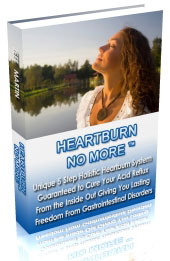

We know that vinegar is acidic and cause more problems to people who have heartburn acid reflux problem. However there is only one vinegar not only the heartburn sufferers can take and it is actually a natural acid reflux remedy which you can east all symptoms during the day.
WOW! That is Apple Cider Vinegar!
Read more about
The Connection Between Vinegar and Heartburn...
Apple Cider Vinegar is vinegar made from crushed and aged apples known as cider. When unfiltered, Apple Cider Vinegar has a brownish-yellow color. Unfiltered cider vinegar, also known as organic apple cider vinegar, contains what is known as the “mother of vinegar” or simply the “mother”. The mother looks like stringy floating globs in the liquid, and is where all of the healing properties of Apple Cider Vinegar reside.
Apple Cider Vinegar contains minerals, as well as trace elements including magnesium, chlorine phosphorous, sulfur, sodium, calcium, potassium, iron, copper, fluorine and silicon. Due of all of its beneficial ingredients, Apple Cider Vinegar is a natural fighter of bacteria, which often makes it a beneficial vinegar acid reflux treatment choice.
How can Apple Cider Vinegar benefit acid reflux sufferers? You may be confused as to how a type of vinegar could be beneficial for treating acid reflux symptoms such as heartburn. After all, doesn’t vinegar have a high acid content? Wouldn’t cider vinegar just exacerbate the problem? Surprisingly, for most acid reflux sufferers, Apple Cider Vinegar helps to relieve the burning sensation and nausea caused by reflux without adding to it.
Why?
Many people with digestive problems like acid reflux, experience problems not because they have too much acid, but because they have too little. Apple Cider Vinegar mimics the acid level of the stomach, which aids in the proper digestion of food, and can help aid the stomach in digesting.
Therefore, in some cases, vinegar acid reflux remedies for heartburn work more effectively than antacids, because although antacids will cure heartburn, they are designed to diminish acid within the system. Thus, antacids will not treat the actual cause if acid reflux is the result of too little stomach acid, and instead can make reflux more frequent.
How should you take apple cider vinegar? Apple Cider Vinegar is available in many forms including liquid, tablet and capsule. However, when using Apple Cider Vinegar as a natural treatment, the only form you should obtain is the organic liquid that contains the “mother” enzyme.
When taking Apple Cider Vinegar, you will first want to shake it well before you ingest it to disperse the mother throughout the liquid. To start, try taking one tablespoon of cider vinegar before each meal. You will likely find the taste of the Apple Cider Vinegar to be quite potent. It is an acquired taste, and you should grow more accustomed to the flavor after the first few vinegar acid reflux treatments.
Nevertheless, should you find it too repellant, there are a few other ways you can take Apple Cider Vinegar such as:
- Mix a tablespoon in a fat free salad dressing or light mayonnaise and eat it with your meal
- Sprinkle a tablespoon on salad or vegetables
- Mix a tablespoon in an 8 oz. glass of water and add a bit of honey to sweeten the drink.
- Make a tea out of ACV by adding a tablespoon of the cider vinegar to hot water and slowly sipping it.
Although it is best to ingest apple cider vinegar prior to each meal, you can also take a tablespoon when your stomach is upset or heartburn acts up.
After taking apple cider vinegar for a few days, many acid reflux sufferers find that their symptoms improve, and continue to improve with treatment in the months that follow. However, in addition, you should be aware that Apple Cider Vinegar has a few mild side effects including stomach upset. Furthermore, Apple Cider Vinegar may worsen heartburn in some individuals. It is also known to thin the blood and should be avoided by anyone taking blood thinning medications such as anti-coagulants.
Always remember that you should speak to your doctor first before starting any treatment, including vinegar acid reflux treatment, and keep in mind that natural treatment should not replace any medication or treatment advice that has been prescribed by your doctor without prior consultation.
To Learn More about it...
Click Here : Stop Acid Reflux NOW!









